Artcena released its new edition of the publication 'How to organize an event in public space - A guide of good practices" (only in French).
Artcena: How to organize an event in public space - A guide of good practices
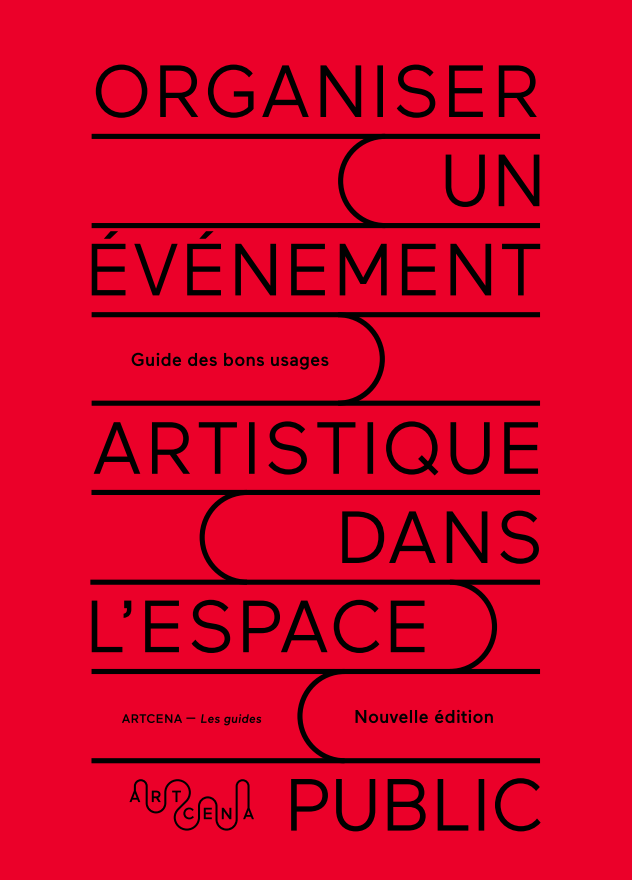

Artcena released its new edition of the publication 'How to organize an event in public space - A guide of good practices" (only in French).
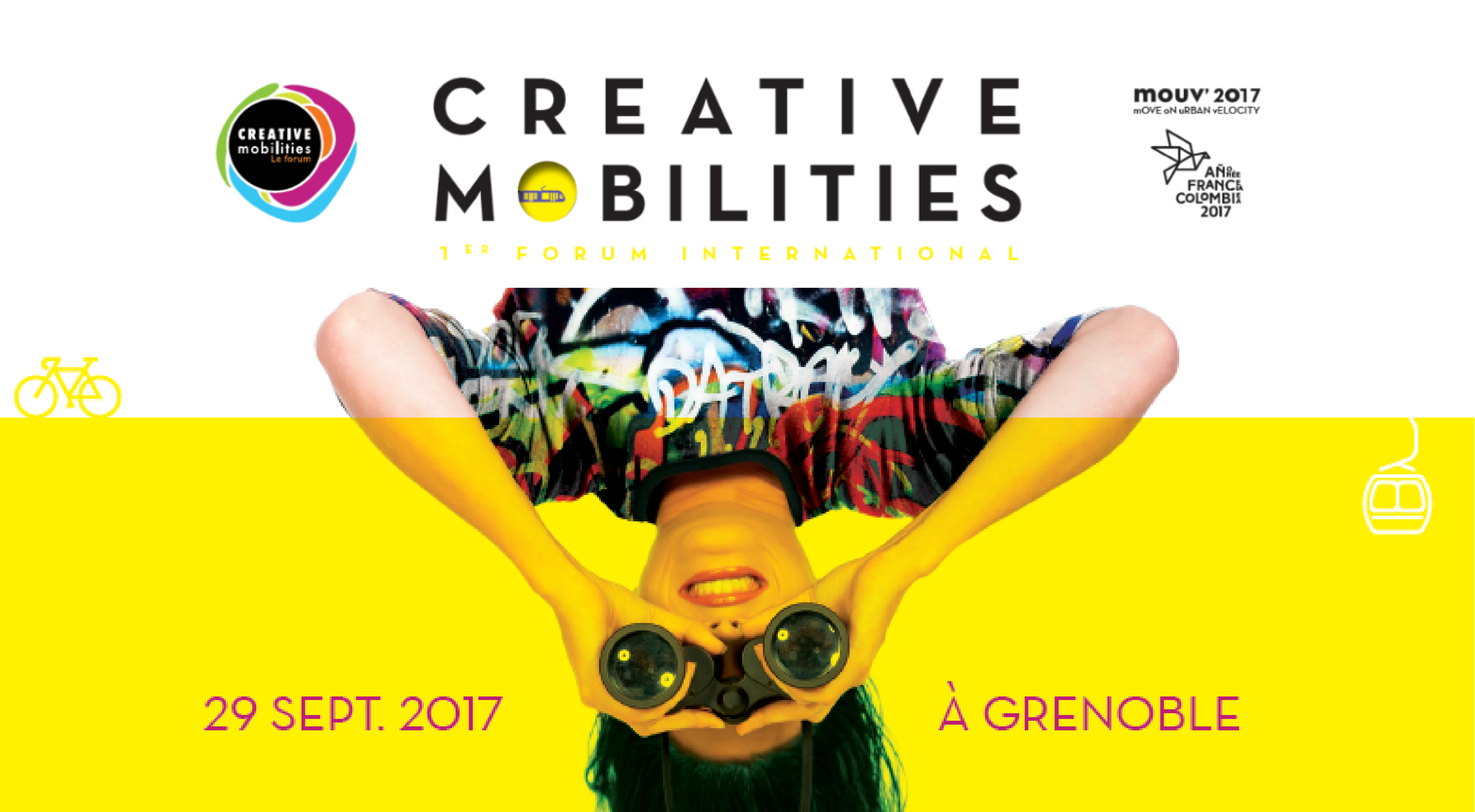
The Creative Mobilities International Forum, co-organized by Territoires Associés, SMTC and Terra21 will be launched in Grenoble, France, on 29 September 2017.
The Forum focuses on the human dimension of urban mobility, including the potential synergies between mobility, creativity, culture(s), and sustainable development in cities and human settlements.
THE FORUM OBJECTIVES
Promoting sustainable mobility forms through culture, education and creativity.
Promoting the territories’ identity and their cultural richness through mobilities.
COMMON CHALLENGES
The ASEF Foundation also published a very interesting article on the links between Creative Mobilities Forum and Agenda 21 for culture.
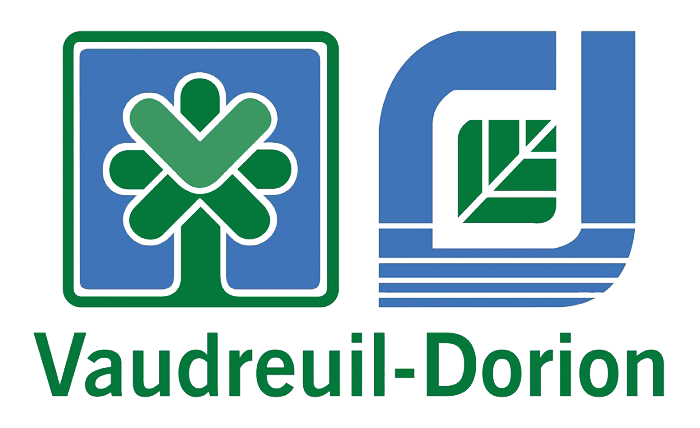
The city of Vaudreuil-Dorion will receive the UN Canadian Ambassador on 20 June 2017. This will also be an opportunity to present the Agenda 21 for culture and its 'Leading City' learning programme.
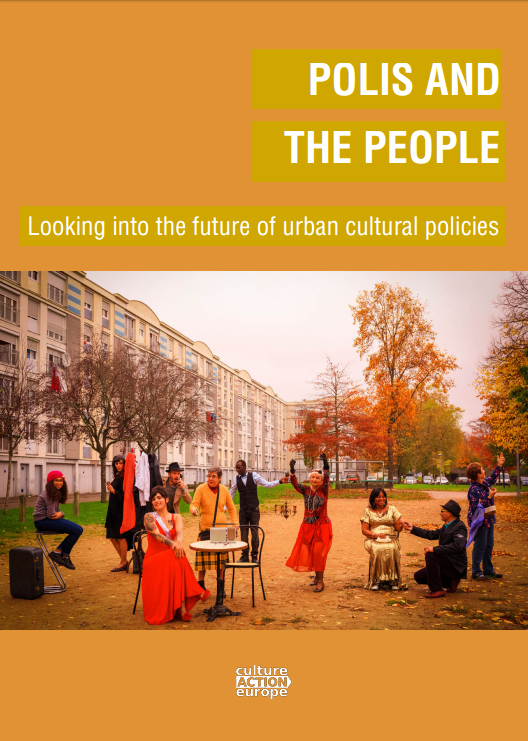
The Culture Action Europe network (CAE) released a new report entitled 'Polis and the People. Looking into the future of urban cultural policies'. Read it now.

The magazine 'Les Inrockuptibles', jointly with the 'In Situ' and 'Lieux Publics' networks released a new special issue entitled "A New Popular Art".

The event 'How to deal with a unicorn. Solutions for cultural management based on a public approach' ('Como tramitar un unicornio. Soluciones para una gestión cultural desde lo público') will take place on 6-7 April 2017 in Zaragoza.
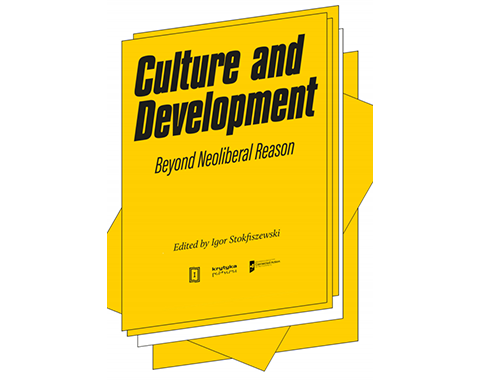
Check out the new publication coordinated by Igor Stokfiszewski 'Culture and Development: Beyond neoliberal reason', exploring our understanding of how culture can influence social development and struggle against economic and cultural inequalities.
The objective of the "International Award UCLG – MEXICO CITY – Culture 21" is, to recognise leading cities and individuals that have distinguished themselves through their contribution to culture as a key dimension in sustainable cities.
The "International Award UCLG – MEXICO CITY – Culture 21" has two categories: the City / Local or Regional Government Award, which recognises a city, local or regional government the cultural policy of which has contributed significantly to linking the values
of culture (heritage, diversity, creativity and transmission of knowledge) with democratic governance, citizen participation and sustainable development, and the Individual Award, which recognises an internationally renowned individual who has made a fundamental contribution to the relationship between culture and sustainable development.
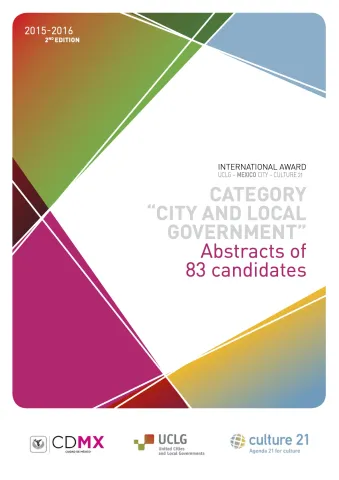
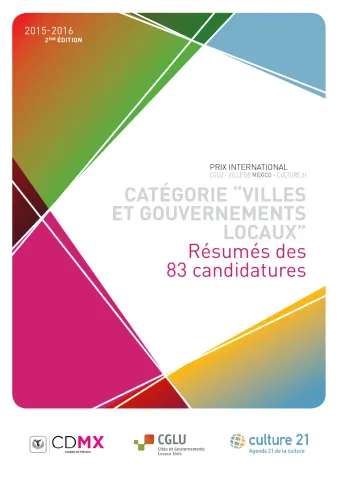
The Award Ceremony took place on 27 October 2016 in the City of Mexico, hosted by Dr. Miguel Ángel Mancera, Chief Minister of the City of Mexico; Eduardo Vázquez Martín, Federal District Secretary on Culture for Mexico City and President of the International Jury and Ing. Cuauhtémoc Cárdenas Solórzano, General Coordinator for International Affairs of the City of Mexico; and with the presence of the winners of the 2nd edition of the Award: Mr. Ousmane Hallé, Mayor of the City of Timbuktu (Mali); Mr. Guy Pilon, Mayor of the City of Vaudreuil-Dorion (Québec, Canada); Mr. Jon Hawkes; and Mrs. Silvia Rivera Cusicanqui.
The winners of the 2nd edition of the International Award UCLG - MEXICO CITY - Culture 21 are:
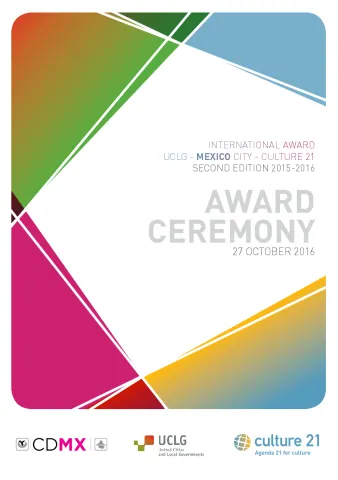
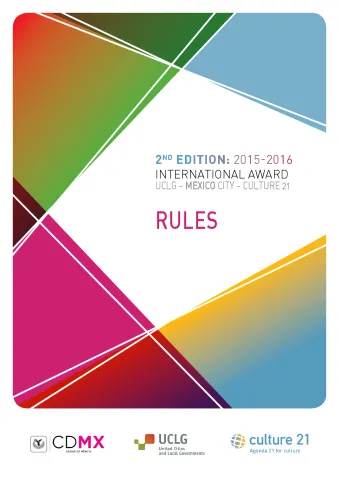
The Jury was formed by five members, international experts, highly eminent figures with a proven track record in the cultural world, ensuring this way the notoriety and relevance of the Award: Eduardo Vázquez Martín (president of the Jury); María Victoria Alcaraz; Emmanuel Kouela; Leônidas de Oliveira and Farida Shaheed.
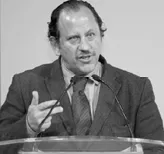
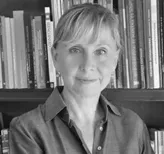
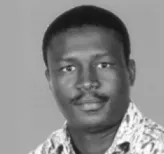
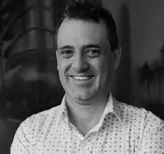
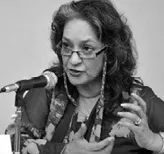
Read the document of presentation of the Jury, the communique of the Jury on the winners, and the complete report of the Jury of the 2nd edition of the International Award:
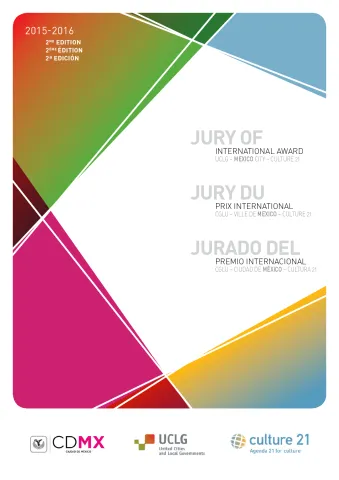
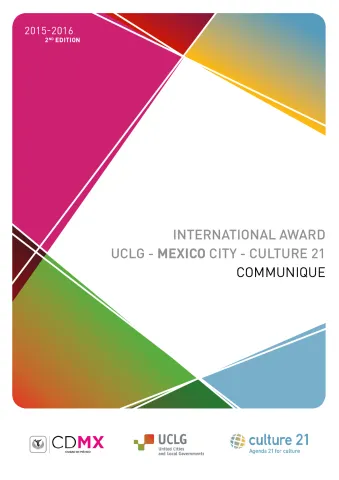
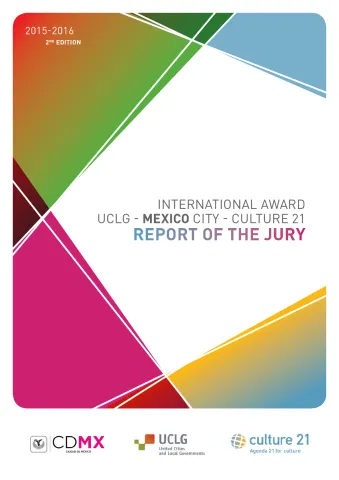
The organisers invite all the members of UCLG (direct or indirect) to nominate relevant personalities only through this form which will have to be sent to the email award (at) agenda21culture.net.
This nomination must be justified, by describing that individual’s contribution to the achievement of the objectives of the Agenda 21 for culture.
Author of the book "The Fourth Pillar of Sustainability: culture's essential role in public planning". With this book, Hawkes significantly contributed to transforming the basic structure of public policy making. The core concept that informs his work has become central to many policy development strategies at the local level throughout the world. By proposing culture as a fourth perspective from which to view sustainability (and indeed, all of the key concerns of public policy), Hawkes not only raised culture to the same level as the three traditional dimensions of policy development – economic, social and ecological – he also helped to focus the "sustainability" discourse on culture. For Hawkes, culture "has always been a process rather than a product" and its value "lies in its making far more than in what is made." Consequently, locally generated cultural action becomes the key to sustainable development and takes place within and between communities. Without a vital and inclusive public culture, imagining a future (what else is planning?) can never be effective or wholesome. Always committed to practical local action, Jon currently works with Melbourne-based organisations, Ilbijerri Aboriginal & Torres Strait Islander Theatre Co-operative, The Substation Multi Arts Centre and J-Studios, an artist run studio collective.
Website: ‘The Hawkes Library’.
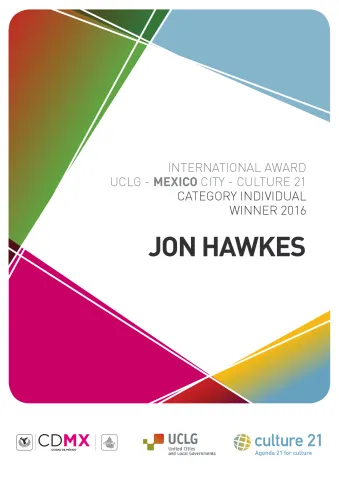
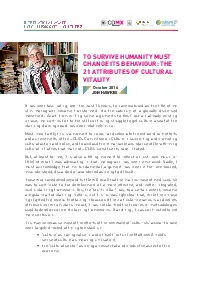
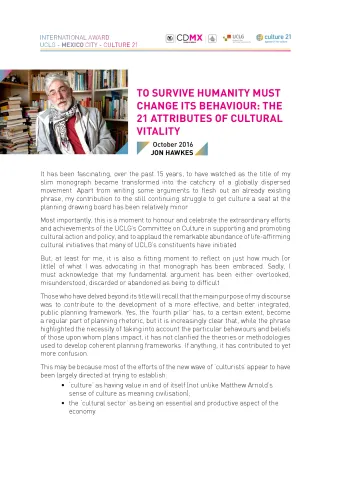
Sociologist and activist, she is a member of the free independent collective Colectivx Ch’ixi in Bolivia. Silvia Rivera Cusicanqui has been professor of Sociology at the Universidad Mayor de San Andrés in La Paz (UMSA), where she is now Emeritus Professor, and has been a visiting lecturer at the Universities of Columbia (New York, USA), Austin (Texas, USA), La Rábida (Huelva, Spain), Jujuy, and the Universidad Andina Simón Bolívar (Quito, Ecuador). Along with other intellectuals, in 1983 she founded the Andean Oral History Workshop (THOA), a self-managed group which focuses on orality, identity and the indigenous and popular social movements, particularly in the Aymara region. In the last few years she has also been involved in the setting-up of El Tambo Colectivo, a cultural centre in La Paz which aims to combine academic knowledge, manual work and environmental practices. She is the author of several books, and she has also directed fiction and documentary videos and films. Silvia Rivera Cusicanqui’s work deals with continuity in the logic of domination of indigenous identities and cultures, including in those contexts where diversity and the value of indigenous cultures have been officially recognised.
Website (in Spanish): www.colectivachixi.blogspot.com.es
Facebook (in Spanish): facebook.com/colectivxchixi
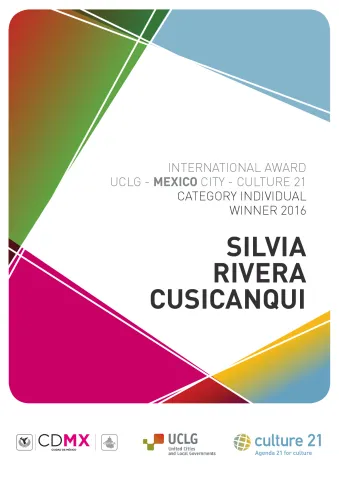
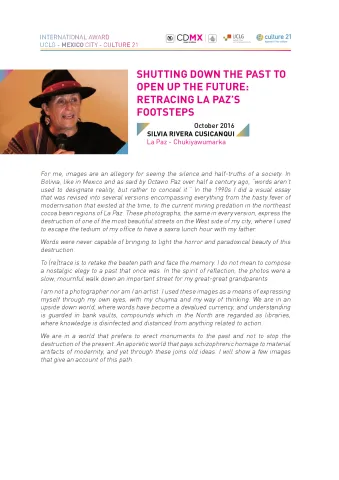
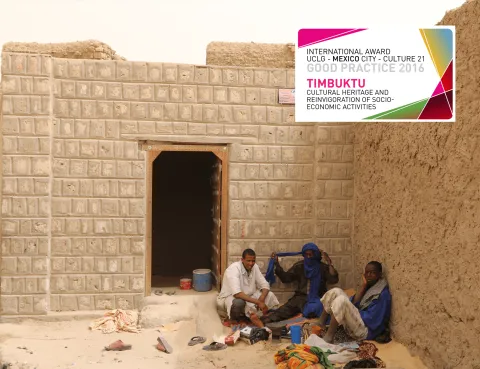
The programme “Cultural heritage and reinvigoration of socio-economic activities in Timbuktu” focuses on the rehabilitation of the sector and of crafts, following the recent terrorist occupation of the regions of northern Mali. This caused significant damage to cultural heritage, practices, and expressions: population displacement; destruction of innumerable historical monuments, memorial sites and ancient manuscripts; intense pillaging of archaeological sites and museums; and prohibition and weakening of cultural practices and traditions. The project associates the rehabilitation of cultural heritage with the rehabilitation of socio-economic activity, in particular of crafts. It has worked on ways of reinvigorating intangible heritage and arts and crafts, and also suggests ways of strengthening the city council’s capacities and improving local governance.
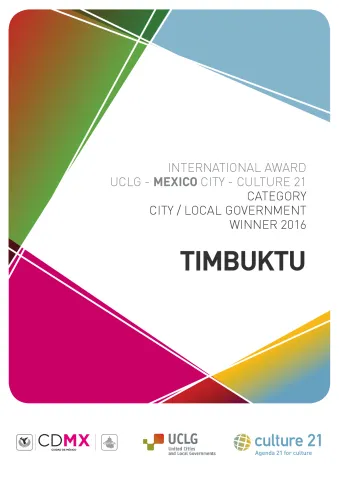
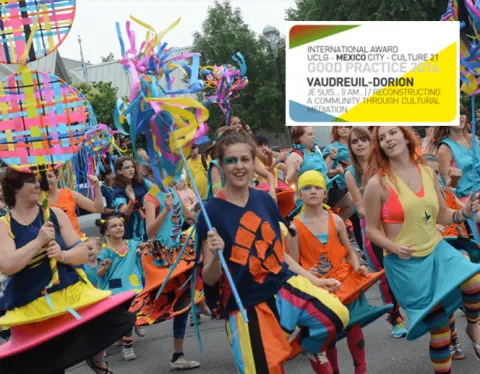
The programme “I AM… / The adventure of one community in the middle of a transformation” has been underway in Vaudreuil-Dorion since 2010, and works to promote the emergence of a united community that experiences differences as richness. Each year, 20,000 citizens take part in some 600 workshops based around 50 main activities. The goal: to create encounters which allow an understanding of others, and encourage respect for differences. Active citizen participation through cultural and creative acts is at the centre of community reinvention. Here, citizens rub shoulders, interact, and learn to understand one another. Besides working directly on social cohesion, these cultural activities contribute to solid progress in terms of environment, town planning, community bodies and their missions, physical and mental health, and business environments.
Website (in French): www.ville.vaudreuil-dorion.qc.ca
Facebook (in French): facebook.com/Je-suis-Vaudreuil-Dorion
Video (Mrs Nichols, Member of Parliament of Vaudreuil, and Mr Couillard, Premier of Quebec) : watch video
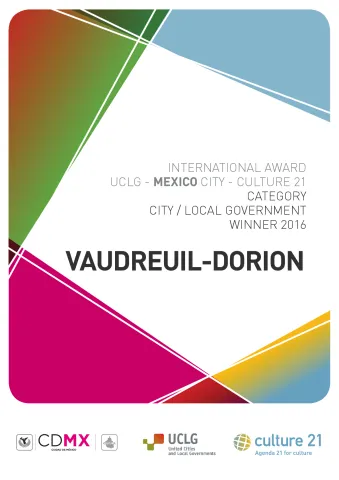
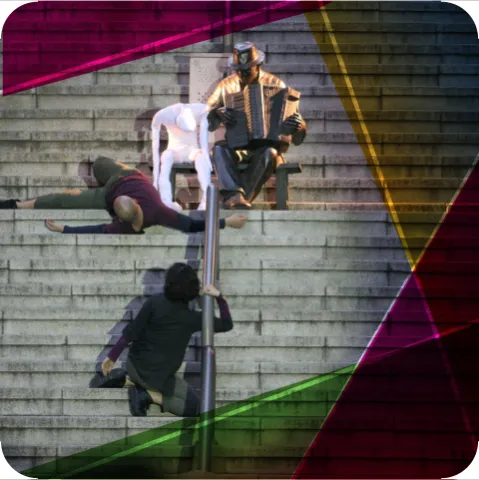
Dakar (Senegal) for the programme "School of Commons".
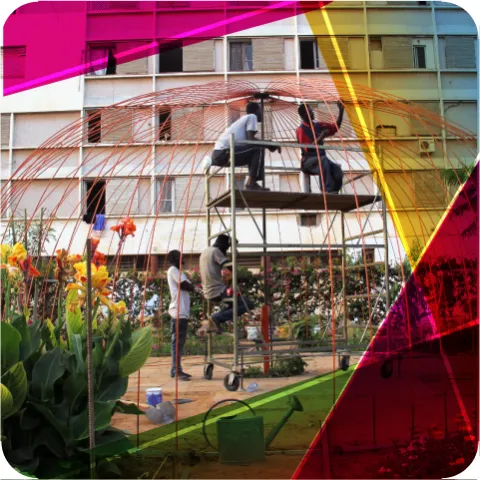
Kaunas (Lithuania), for the project "The Šančiai Cabbage Field Project – small scale seeks big transformation"
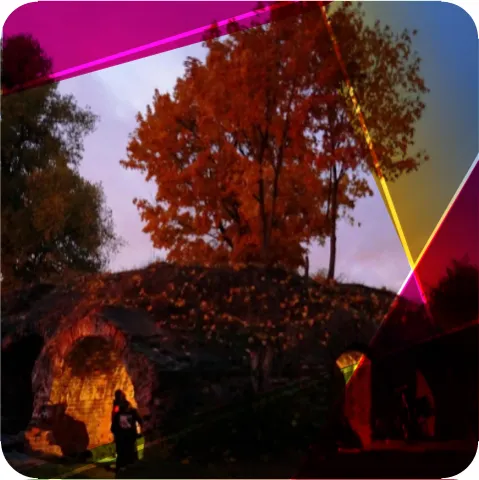
Lake Mégantic (Quebec, Canada) for the programme "Rebuilding Lake Mégantic"
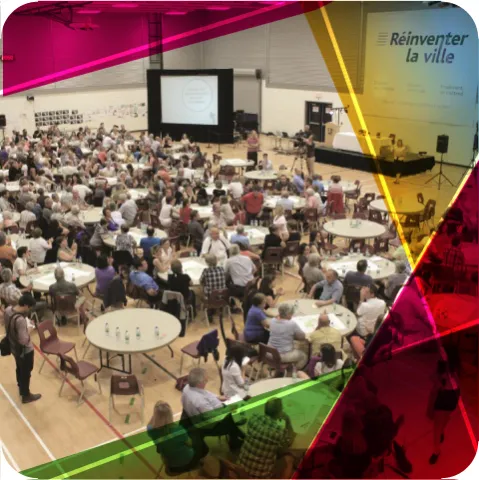
Montevideo (Uruguay) for the programme "Cultural Co-Management Civic Centre: SACUDE"
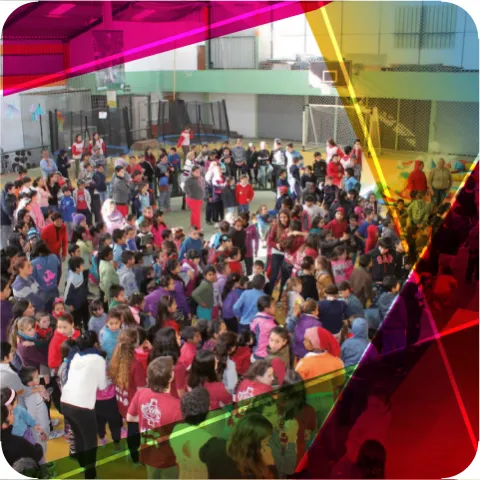
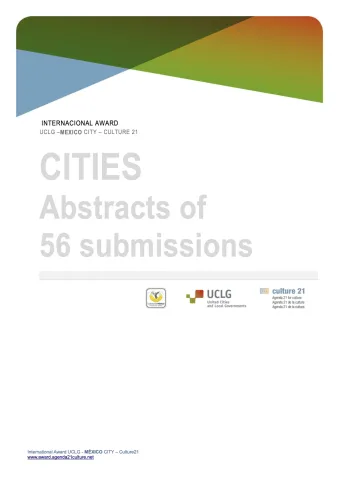
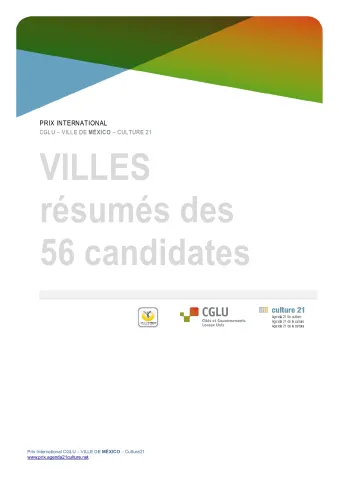
The Jury was formed by five members, international experts, highly eminent figures with a proven track record in the cultural world, ensuring this way the notoriety and relevance of the Award: Ing. Cuauhtémoc Cárdenas Solorzano (president of the Jury); Gonzalo Carámbula; Dr. Danielle Cliche; Catherine Cullen and Dr. Alicia Ziccardi.
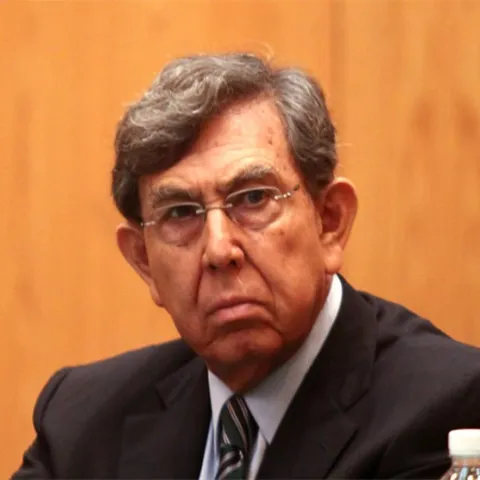
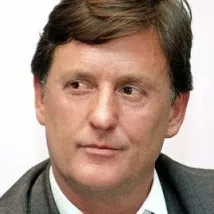
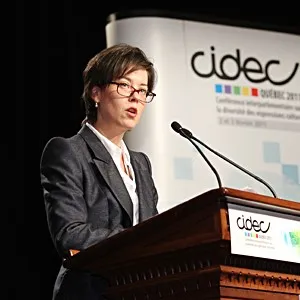
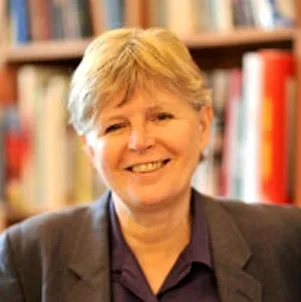
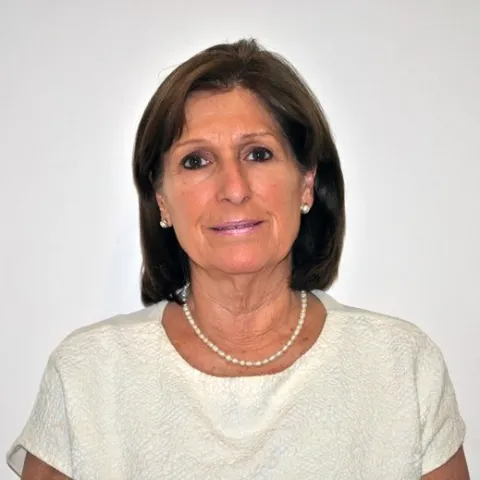
Read the document of presentation of the Jury, the communique of the Jury on the winners, and the complete report of the Jury of the 1st edition of the International Award:
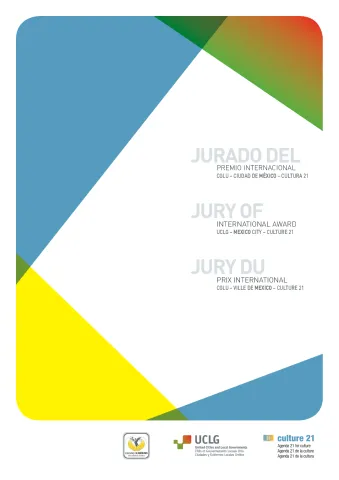
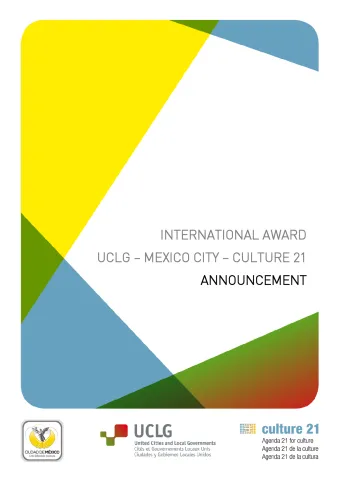
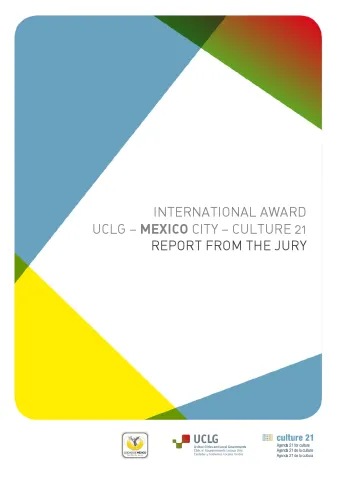
The organisers invite all the members of UCLG (direct or indirect) to nominate relevant personalities only through this form which will have to be sent to the email award (at) agenda21culture.net.
This nomination must be justified, by describing that individual’s contribution to the achievement of the objectives of the Agenda 21 for culture.
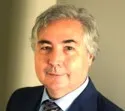
Professor Emeritus of Sociology and of City and Regional Planning of the University of California at Berkeley and Professor of Sociology and Director of the Internet Interdisciplinary Institute (IN3) in the Universitat Oberta de Catalunya. Manuel Castells’ work has emphasized the important role of social movements and new technologies in the transformation of the city. He has documented urban transformations, recognizing the important role that culture plays in these processes. He has promoted a more decisive role of cities and local governments in a globalization created by and for the people and social movements. He has systematically advocated a new model of sustainable society which includes diversity, locality and creativity as basic elements. He has promoted the concept of “project identity” to describe the collective action needed to guide the future of all societies.
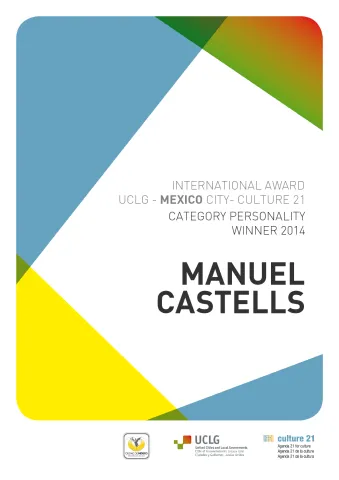
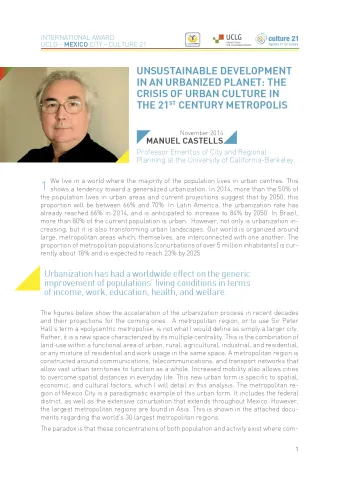
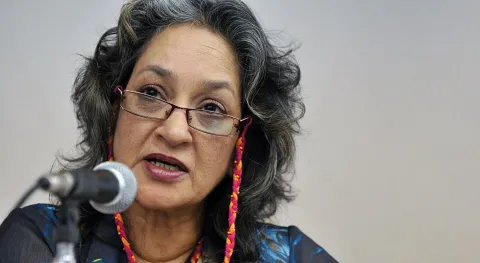
Pakistani sociologist, Farida Shaheed has worked on projects which incorporate culture to reinforce human rights. Her career in the United Nations began in 2009 as an independent expert and since 2012 she has been the Special Rapporteur in the field of cultural rights. From her position, Shaheed has proposed several initiatives to integrate culture and human rights. Farida Shaheed’s periodic reports are fundamental references in the relationship between culture, human rights and sustainable development. She has identified and documented the main challenges of cultural rights present in our societies, including the freedom of artistic expression, memory processes and cultural rights of women. She is an essential reference in the struggle for explicit consideration of culture in the Post-2015 Sustainable Development Goals of the United Nations.
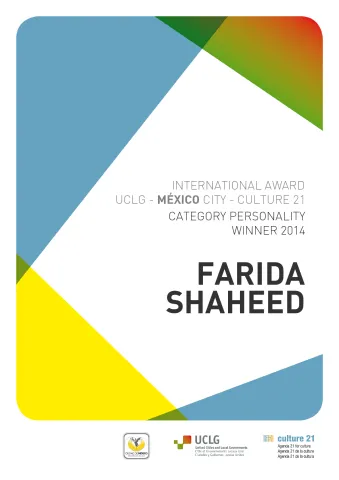
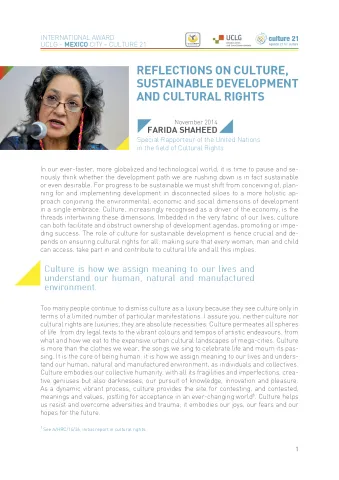
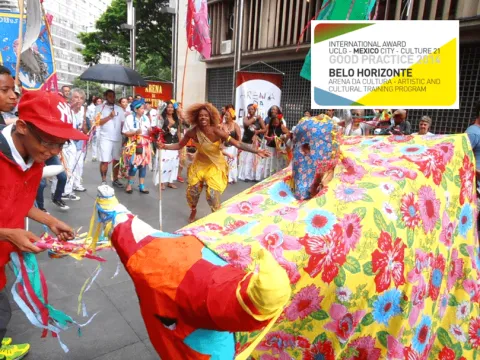
The programme “Arena da Cultura – Artistic and Cultural Training Programme” of the city of Belo Horizonte is the main project of the cultural policy of the city. Created in 1998, it is oriented toward the democratization of the cultural goods and services of the city, in order to reduce the social and territorial inequalities. The Jury emphasizes the integrality of the following elements: (a) the population: the programme is addressed to a diverse public, from 6 to 80 years of age with heterogeneous educational and socioeconomic levels; (b) the territory: the programme covers the entire city, including 16 cultural centers and 33 “BH Ciudadanía” (citizenship groups) and contributes to the significance of public spaces; (c) culture: the programme is based on a transforming artistic experience at the center of the entire process, with a careful evaluation of the work with professionals and artists as essential people for creating capacity, knowledge, skills and abilities in everyone; (d) governance: the programme has a management model which integrates public institutions and an extensive network or associated organizations, clubs and NGOs. The project provides evidence of a very positive impact on the cultural, social and territorial transformation of the city. It is a programme which perfectly applies principles and recommendations of Agenda 21 for Culture.
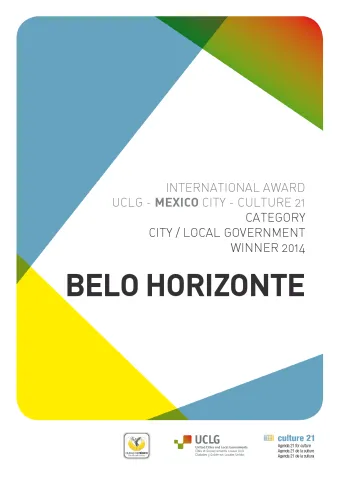
“Twinning for a Culture of Sustainability” presented by the city of Hannover (Lower Saxony, Germany), focuses on international cooperation in the area of culture with twinned towns, through three successive projects
(called aware&fair, fairCulture and KlimaKunstStädte), actively involving the cultural actors of the city and permitting citizen appropriation of cooperation projects.
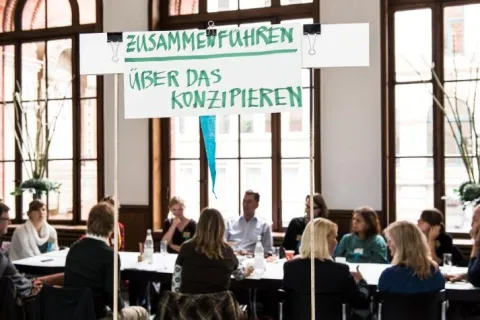
“The Reemdoogo, Music Garden”, presented by Ouagadougou (Burkina Faso), a project focused on the artistic and professional education of the city youth.The project links culture, from its intrinsic values, to processes of employment creation, to social cohesion and urban construction of the city, with user-friendly urban planning, perfectly symbolized by the garden.
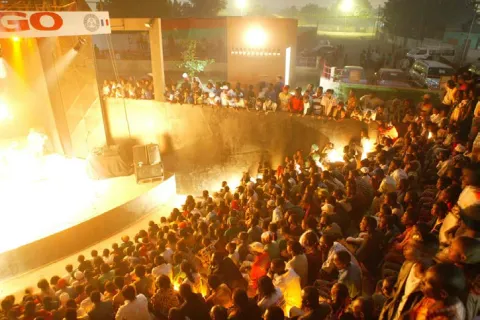

The National Academy for Theatre and Film Arts (NATFA) will organize the International Summer Academy "Rock the Boat! Entrepreneurship and Leadership in the Performing Arts and Creative Industries", to be held in Sofia (Bulgaria) on 12-16 June 2017.
© Copyright 2025. All rights reserved.